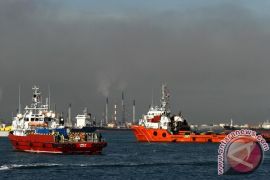The Indonesian Institute of Sciences (LIPI) has predicted that global challenges and internal conditions could affect Indonesia`s national economic performance in 2017.Jakarta (ANTARA News) - Indonesia is expected to have a relatively improved economic performance in 2017, while still needing to prepare itself in the face of global and domestic challenges.
Global economic uncertainties will continue to be felt next year and affect the Indonesian economy. The Indonesian Institute of Sciences (LIPI) has predicted that global challenges and internal conditions could affect Indonesias national economic performance in 2017.
The global economic dynamism in 2017 could have an impact on Indonesian economic conditions. There will be uncertainties in Europe after the Brexit, and uncertainties in the direction of United States polices after the election of Donald Trump as US president.
Trumps protectionist policies, if implemented, would have a negative impact on market confidence, not only among business people and investors in the United States, but throughout the world.
If Trump enacts the policies he pledged in his pre-election campaign, the impact would result in a worldwide economic slowdown, including in Indonesia.
The largest external risk would be the impact of swelling debt and rising non-performing loans (NPL) in China that would result in a slowdown in that countrys economic growth, from the expected 6.6 percent this year, to 6.3 percent in 2017.
The slowing of economic growth in China, and fluctuations in world commodity prices, will also contribute to the nation's economic performance.
China, the worlds second largest economy, is Indonesias main trading partner, therefore, a Chinese slowdown would have its impact on Indonesias economy.
A simulation by the National Development Planning Agency (Bappenas) showed that the Chinese policy could slow Indonesias economic growth by 0.03 percentage points in 2016, and 0.72 percentage points in 2017.
"The biggest impact would be on investments, with growth down 1.02 percentage points," Minister for National Development Planning/Head of Bapennas Bambang Brodjonegoro said.
These will become external challenges that the countrys policy makers have to take into account in developing the countrys economy, according to LIPI researcher Maxensius Tri Sambodo.
Besides external factors, the country is also facing domestic challenges, which include national and local political conditions. The domestic political conditions are colored with the public's euphoria over civil freedoms, though democratic institutions to channel such aspirations seem to be clogged.
This condition can directly or indirectly influence the investment climate and the nation's economic performance, said Maxensius.
Indonesia should build a competitive economy which is resistant to turmoil by strengthening its favorite sectors, such as the maritime sector.
Increasing competitiveness in the maritime sector needs economic policies regarding the four inclusive pillars, namely human resources, infrastructure, governance and financial institutions.
In spite of the, Maxensius is optimistic that the Indonesian economy in 2017 can grow by 5.3-5.6 percent, exceeding the governments projection in the state budget of 5.1 percent.
"The LIPI projection shows more optimistic results than the governments estimate. Our economic growth prediction is in the range of 5.3-5.6 percent, or at least at a moderate level of 5.46 percent," Maxensius said in Jakarta on Wednesday.
Maxensius explained that household and government consumption could serve as the primary booster of the economy as a result of the inflation rate, which could be kept under control, as projected, at four percent in 2017.
The low interest reference rate and the adoption of 14 economic policy packages will also boost the performance of investment, which will have a positive impact on the performance of economic growth next year.
"The low domestic interest rates will contribute to investment growth. Besides this, the impact of the 14 economic policy packages will also be felt in 2017. The policy packages provide simplified investment licensing facilities for the ease of doing business," asserted Maxensius.
However, export performance is expected to experience no recovery, as a result of the global economic slowdown. For this, the government should carry out market diversification to new export destinations in the Middle East, Africa and Latin American countries.
Internal risks are expected to come from the private sectors investment, which tends to be limited as indicated by the low bank credit growth.
Bank credit growth of less than 10 percent this year was the lowest since 2009 at the start of commodity boom. "This means, now is the end of the commodity boom," Minister Bambang said.
One factor causing low bank credit growth was an increase in banking risks, as reflected by the rise in NPL that reached 3.1 percent in September 2016, which would discourage investment.
Based on the Bappenas simulation, if NPL increases and the credit slowdown continues, growth in 2016 and 2017 is expected to be lower than the baseline by 0.04 percentage points and 0.34 percentage points.
Lower growth of investments would result in lower economic growth of 0.15 percentage points in 2016, and 1.01 percentage points in 2017.
On the inflation, LIPI projected that the inflation rate would be at four percent in 2017, based upon world crude price increases, as a result of production restrictions by the Organization of Petroleum Exporting Countries/OPEC, while food prices should be given special attention.
It also predicts that the rupiah exchange rate against the US dollar will be in the range of Rp13,252 per US$1, thanks to the surplus in the balance of payment as a result of capital inflows, and in the repatriation of funds through the tax amnesty program.
In general, LIPI hopes that the simultaneous regional head elections in 2017 will be carried out in a conducive climate. Also, improvements in democratic conditions has positive correlations to economic development.
National and regional political stability and conduciveness can serve as a decisive key to maintaining the momentum of economic growth, particularly in maintaining national investments, which are currently growing well.(*)
Reporter: Andi Abdussalam
Editor: Heru Purwanto
Copyright © ANTARA 2016





